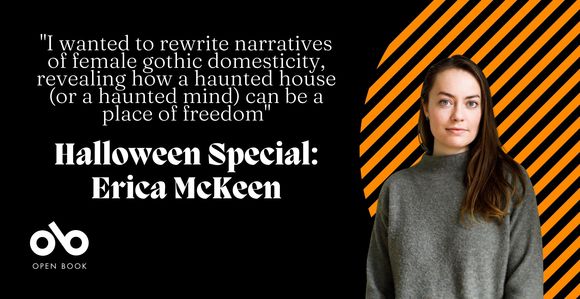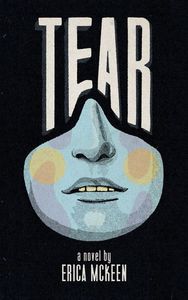Halloween Special: CanLit's Smart & Bold New Horror Queen, Erica McKeen, on Isolation, Manipulation, & Female Rage
It's spooky season and to pay tribute to the literary greats who have scared us over the years, we're speaking with one of Canada's newest and most exciting voices when it comes to creating tension and terror, Erica McKeen.
McKeen's debut novel, Tear (Invisible Publishing) is making waves for its delicious creepiness and brilliant storytelling, which McKeen creates with expert control in the tradition of Shirley Jackson. Filled with quiet dread and building to a climax both frightful and satisfying, McKeen is not only setting out to scare our pants off – she's exploring complex social issues about identity, isolation, manipulation and, in particular, women's anger and what we're comfortable witnessing in terms of female rage.
The woman at the heart of Tear is Frances, a reclusive undergraduate who is approaching the end of her degree. Living in a basement apartment, she is seemingly forgotten about by her upstairs roommates and even the world at large. When one day she turns the doorknob and finds herself literally unable to leave her apartment, she is forced to confront hazy and confusing memories of how she arrived where she is – and to decide whether the tapping she hears, growing ever louder, on her bedroom wall is real or not.
McKeen's dark, taut storytelling and claustrophobic atmosphere make Tear one of the most exciting debuts of the year, and create a perfect foundation for her thoughtful, fierce feminist exploration of Frances' situation. We're excited to speak with her about the novel today as she tells us about the challenges of writing an entire novel with virtually only one character, why exploring female rage still feels frustratingly forbidden, and how Tear operates as a distorted coming of age narrative.
And for more on Tear and Erica, you can check out Stacey May Fowles' latest Book Therapy column, where she discusses her reading of Tear alongside the classic horror movie, Halloween.
Open Book:
Frances is a fascinating character and has to carry much of the book alone. What was it like to have so much of the novel focused on her and a limited setting? What were some of the benefits and drawbacks to the tight setting and casting from a craft standpoint?
Erica McKeen:
Focusing almost entirely on Frances in the basement (at least for a large portion of the novel) was both frustrating and liberating. It’s really satisfying to hear that you think Frances is “fascinating”—I think so, too—but it was admittedly difficult to make her interesting when she has no other characters to interact with and is so passive in nature. In order to solve some of those problems, I layered her with a complex backstory punctuated by moments of intense action. I also envisioned the house, the main setting of the novel, as a character in its own right, making Frances’s experience in the basement thicker and more substantial. Personally, even with the challenges it presented, I loved being alone with Frances in the basement for so much of the book—it allowed me to give her my full energy and attention, and bring her to life.
OB:
One of the big themes in Tear is the idea of women’s rage and anger. Does it still feel forbidden in some sense to explore female anger in fiction, even when we’re increasingly accepting of female trauma, violence, and sexuality?
EM:
It still feels forbidden to me, both in my everyday life and in the realm of fiction, to express what I deem to be an appropriate amount of anger in response to a given offence. And by that I mean to say, women are constantly told—in so many words, looks, and suggestions—that they are overreacting to a situation, that they are too loud and upset, or that they are overstepping. We are slowly, as a society, beginning to understand the mundane and “minor” violences that women regularly experience, but we’re still often unsure how to absorb the half-thwarted scream that many women feel they must release. (I describe this scream in a figurative sense, but, really, it does feel good to scream sometimes—am I the only one?) I still believe it’s best to proceed with grace and understanding whenever possible—part of the point of Tear, after all, is that rage and revenge are monstrous manifestations of pain—but there should be space available in our culture from women to feel and express what’s happening inside of them.
OB:
The title of Tear, like much of the book, has an element of intrigue, resisting easy reading with its potential double meaning. How did you choose the title and what does it mean to you?
Your CanLit News
Subscribe to Open Book’s newsletter to get local book events, literary content, writing tips, and more in your inbox
EM:
The title of the book was actually Frances, in echo of Mary Shelley’s Frankenstein, until the moment before submitting to publishers. Tear felt punchier to me, and I loved its capacity to hold double meaning. The title is intentionally a homonym: it can either be pronounced “tear” as in “rip” or “tear” as in “teardrop,” reflecting the combination of horror and grief in the novel. Ultimately, the title balances uncertainly between two alternative but related interpretations, and that’s what so much of the book is about—resisting easy answers and conviction.
OB:
Tear has been called a coming-of-age story seen through a horrifying lens; a “deformed Bildungsroman”. How do you feel about that characterization? And how do you see the coming-of-age element in Tear informing Frances’ character development?
EM:
I suppose I like the characterization of a “deformed Bildungsroman”, especially because I’m the one who wrote it! One of the biggest considerations of Tear is what it means to feel stunted during the process of growing up and entering the “adult” world. I put “adult” in quotation marks here because I’m still unsure what the adult world is or how being an adult is really all that different from being a child. Frances can’t locate the difference either, and she’s reluctant to leave her child-self behind. Essentially, Frances feels that she can’t bring her child-self along with her as she graduates from university and enters a world of apparent professionalism, self-definition, and straightforward answers. In the basement, she’s torn between present-day “reality” and a blur of memory. As a result, her character development is a kind of expansive regression—a paradoxical, monstrous unbecoming.
OB:
How do you view Tear in terms of genre? Did you set out to incorporate horror elements or take inspiration from great women horror writers (including, possibly, those whose work Tear has been compared to, like Mary Shelley and Shirley Jackson)? Or was genre not a conscious concern during the writing process?
EM:
Admittedly, most of my influences while writing Tear were those working within the horror genre—including, as you mentioned, Mary Shelley and Shirley Jackson, but also writers like Charlotte Perkins Gilman, Henry James, and John Ajvide Lindqvist. Despite my genre-specific reading, Tear was never simply a horror novel to me. Yes, it was supposed to be scary, unsettling, and dark. I wanted to highlight both how terrifying mental illness can be and how horrible the aftermath of a life full of manipulation and gaslighting really is. And, yes, I wanted to rewrite narratives of female gothic domesticity, revealing how a haunted house (or a haunted mind) can be a place of freedom and creativity as well as isolation and claustrophobia. But Frances’s story, the story of Tear, was always about loss, identity, and memory as much as it was about fear, monsters, and things that go bump in the night.
OB:
Given that you’ve written a wonderfully dark book and it’s spooky season, do you have any Halloween or horror-informed traditions or hobbies you’d like to share with readers?
EM:
Walking is a big part of my daily routine, so I always try to schedule in some colourful autumn forest walks and corn mazes in the fall season. I love watching an excessive amount of Halloween movies and shows—it’s such a guilty pleasure. Anything from The Evil Dead to The Haunting of Hill House Netflix series to The Simpsons Halloween Specials to Over the Garden Wall. I’m also a big October foodie and will consume anything with pumpkin in it, as well as cider, candy, Halloween-themed baked goods, squash soup… It’s probably a good thing, in the end, that I walk so much in the fall—it really helps to counterbalance all the eating!
_______________________________________
Erica McKeen was born in London, Ontario. She studied at Western University, and her work has been nominated for the Pushcart Prize, longlisted for the Guernica Prize, and shortlisted for The Malahat Review Open Season Awards. Her stories have been published in PRISM international, filling Station, The Dalhousie Review, and elsewhere. She lives in Vancouver, British Columbia. Tear is her first novel, and has been selected as a 49th Shelf Editor’s Pick for September 2022.






